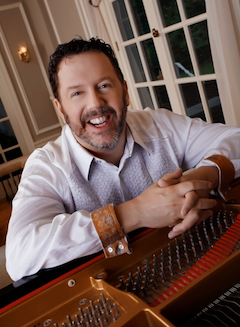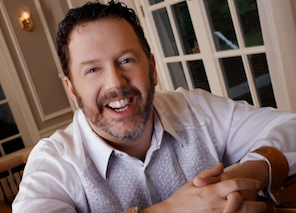
Paskus photography
Jeffrey Sykes is one of those “citizen musicians” you hear about these days. He’s a concert pianist, on the one hand and, on the other, a crusader for the notion of interactivity — as a way to draw children to classical music, but also as a means of experimenting with new ways to build audiences.
He teaches at UC Berkeley and CSU East Bay as a vocal coach and accompanist, and is also the founder and artistic director of the Bach Dancing and Dynamite Society of Wisconsin. In addition, he heads Opera for the Young, a touring company in the Midwest, which since 1970 has established itself as one of the more successful outreach organizations.
This weekend, Sykes will take part in two concerts in the Music in the Vineyards chamber music festival, playing music by composers ranging from Giancarlo Menotti to Witold Lutoslawski to Antonín Dvořák.
What do you like about this wide-ranging program at Music in the Vineyards?
At my own music festival, of course, I get to pick the music that we play; but in most festivals, you are assigned music. In the case of two of the pieces on this concert, I didn’t even know them. So it’s a slightly different process of finding out what these works mean to me personally.
I didn’t know the Mendelssohn viola sonata piece — I didn’t even know it existed! It’s one of Mendelssohn’s early unpublished works, written when he was 14 years old. I played through it with my violist partner [Masumi per Rostad] for the first time this morning. I’m struck by how incredible it is that a 14-year-old kid — even one with every advantage in musical life, like the young Felix Mendelssohn — could write music of such conviction. Sure, there are some moments of compositional awkwardness, but all the ideas are expressed with such forthrightness, conviction, and intensity. I love how the slow introduction — a rarity in Mendelssohn’s chamber music — has this timeless, improvisatory feeling, like he’s feeling out the tonal space and the connection between the viola and the piano. I love finding new pieces by composers I thought I knew.
Dvořák’s dumkas are works that alternate music that’s very rhapsodic, contemplative, and inward-directed with music that’s very outgoing and intense. [Dvořák wrote many of them in various pieces over the years; the Dumky Trio is a collection of six dumkas.] It seems reflective of the way we experience emotion. Joy is more joyful when it follows sadness; intense meditation can easily become obsessive yearning; peaceful states are often interrupted by agitated thoughts. This is music of the highest compositional caliber, but it’s reality-based. It gives this trio and much of Dvořák’s music a directness which I treasure.
I’m struck by how incredible it is that a 14-year-old kid Felix Mendelssohn could write music of such conviction.
I’m playing Menotti’s Suite for Two Cellos and Piano with Brandon Vamos and Robert de Maine. I know Menotti’s music mainly as a vocal coach. It’s always interesting to me to explore a composer’s “other side” — in this case, Menotti’s instrumental music side. The two slow movements of the suite show Menotti’s incredible gift for melody. He can stretch it out forever without losing intensity — I love that. And the cello, of course, is the most vocal of the string instruments; the cello lines really could be vocal lines.
As a vocal coach, how do you bring a young person along? What is the art of coaching?
First, let me be clear, I am not a voice teacher. My interest is not in developing technique per se. What I see as the art of coaching is finding out where a person is in terms of their vocal abilities and helping them to craft a performance — whether that means cleaning up issues of intonation or rhythm or diction, or fine-tuning the poetic interpretation, or whether it means all of those things together. But if I see obvious problems I’ll certainly point that out … if, for example, a student has an issue with how they’re hearing.
What do you mean how they’re hearing?
Whether they hear a pitch and intervals correctly; whether they hear the relationships between pitches and tonality of a work absolutely correctly. If they are actively able to hear — and hear in advance of what’s going on — then their chances of singing a tune are a billion-fold greater. It’s one of the basic precepts of singing or playing any instrument that requires you to have good intonation — you have to be able to hear the pitch before you perform it.
The thing that’s most indicative of success is flexibility, a willingness to try and experiment to see what works, the willingness to fail.
Do you have any thoughts on the psychology of success in music?
The thing that’s most indicative of success is flexibility, a willingness to try and experiment to see what works, the willingness to fail, to screw it up and learn from screwing up. Students who succeed have this mind-set that allows them to fail at something and learn how to do it better, how to zero in on a solution that works for them.
To succeed as a singer, you need to be able not only to sing well in every style that comes your way — you know, hundreds of years of music — you need to be able to sing in a lot of different situations, whether it’s on the San Francisco Opera stage or in a hotel convention room that has terrible acoustics and a digital piano. You need flexibility to act under different directors, and to be able to act when you’re singing in an unstaged piece and really convey the text. Of course, the same thing applies to a pianist or a violinist. You have to be a master of all styles and a master of all situations.
Did you have a coach as a child who taught you these ideas about flexibility?
No, but my piano teacher had a critical influence on me. She had this gift — and I have to say I still don’t entirely understand her gift! — but it was the ability to make the exploring of music fun and rewarding. It wasn’t just the playing, it was the exploring. It was the figuring out. It was the discovery. And I think it was that idea of discovery that really set me on this path and shaped me as a teacher and a musician. It wasn’t a chore for me to practice. It’s like kids who work on video games today: They discover the new level. And it was like that: discovering the new level of thinking about this phrase or this style, or this particular technical issue.
And that process of discovery didn’t stop at performance. It wasn’t like you achieved the final result when you have a performance. Especially the first performance, which is just the beginning of discovering what’s in a piece of music and what you bring to it.
So is it fair to say that you are not afraid the audience for classical music is fading away?
No, I’m not afraid of that. I think the audience is changing. We as classical musicians grow up in a world in which this is the language we speak. When we give a performance, most of the people in the audience don’t know that language, and it’s our job — and this is an absolutely necessity — that we as performers recognize that fact and accommodate this disparity.
I think it was that idea of discovery that really set me on this path and shaped me as a teacher and a musician.
The performers have to set up something that allows an audience at varying levels to engage emotionally in the music they’re listening to.
Here’s a pet peeve of mine: program notes, preconcert lectures. I believe very strongly in information, and one of my master’s degrees is in musicology. That said, when you go to a performance and you have somebody tell you about the historical background of a certain piece of music, it sets you up to have an intellectual experience with the music you’re about to hear. Michael Adams, one of the artistic directors at Music in the Vineyards, gives introductions to every piece performed in the festival. And his introductions are the perfect combination of humor, information, and real help in listening and/or navigating the emotional landscape of music.
Beyond program notes, I think it’s far more important that we engage people emotionally in the sound of the music. You know, does it really matter that Bartók was living in Basel when he wrote the Sonata for Two Pianos and Percussion? Does it help me understand the music in any way shape or form?
So what does help?
Words and activities that help us engage. Experiences that help us engage. I just recently did a performance of this Bartók piece I mentioned. One of the things I did was to split the audience up into four groups and take five minutes to teach some of the rhythmic motifs of the piece so that they could execute them. And then we performed the piece, and they recognized these things! The point is that, once they had that experience, they were primed to listen to that piece in a very different way.
We, as performing artists of classical music, really have to help our audience have an authentic experience.
Turning to the Dancing and Dynamite Society, are there particular innovations that you are most proud of?
Well, sure. We’ve just had our 21st season, and from the get-go we’ve been on the forefront of this whole idea of interactivity. And so we offer personal reflections on music. I think what audiences want is to understand the musicians’ personal connection with the music they play.
One of the other things we’ve done since the beginning is to collaborate very closely with artists in other media. In our very first performances, we commissioned an artist to create paintings for the hall where we were performing. We got dancers involved, and actors. We’ve done things with stage lighting. So this is all to explore the way other media can influence music and create a setting that allows people to focus more on the music.
Also, one other thing: Some people have this attitude about classical music that it’s sacred, that the music has to be performed exactly the way the composer says and the way it was written. I don’t believe that.
We did a performance of Messiaen’s Quartet for the End of Time. Now, Messiaen wrote a very extensive introduction that has a lot of quotations from the Book of Revelation and the inspiration for each of the movements. What I did was find extracts from both the introduction and the Book of Revelation and other relevant sources, and I had an actor read these between the movements. So, interrupting the flow of the music. Now, for a lot of people that might seem like heresy, but I’ll tell you I’ve never had an audience more attentive through a piece of music. It was a very mixed audience; some had never heard of Messiaen. You could have heard a pin drop. Even reviewers acknowledged that it made a difference. So I’m not afraid to do things like that. Sometimes it works, sometimes not. But I think people appreciate that you tried.
And that’s your obligation as an artist, is it not?
Absolutely. Absolutely. These things I try grow out of my belief that we, as performing artists of classical music, really have to help our audience have an authentic experience. That’s very much part of our responsibility.

